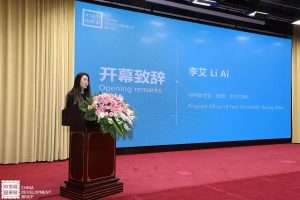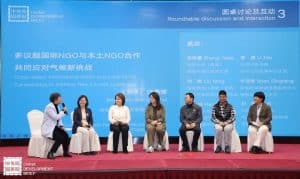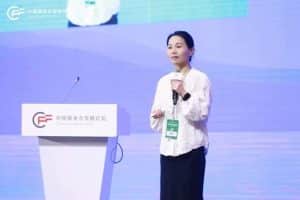On December 20, 2024, the 8th China Development Brief Forum was successfully held at the Beijing Ritan Hotel. Organized by China Development Brief (the Beijing E-share Public Information Consulting Center) and funded by the Ford Foundation (USA) Beijing Representative Office, the forum also received strong support from the Beijing Service Center for Overseas Non-governmental Organizations, the SEE Foundation, Beijing Gingko Foundation, Institute for Global Decarbonization Progress, the C Team, and the China Environmental Grantmakers Alliance (CEGA).

CDB Forum 2024
Over 130 representatives from domestic and international NGOs, academic institutions, and enterprises gathered to discuss the evolving roles of NGOs and opportunities for collaboration in the context of climate change.
Focusing on Climate Issues: Challenges and Opportunities
Under the theme “Facing Challenges and Seizing Opportunities: How NGOs Can Participate in Climate Action,” the forum aligned with the conclusion of COP29 and the pressing global climate agenda.

Ms. Li Ai
During the opening ceremony, Ms. Li Ai, Program Officer at the Ford Foundation Beijing Representative Office, delivered a speech emphasizing the urgency of addressing global climate change. She discussed the challenges and opportunities for NGOs involved in international advocacy and climate action, highlighting the Ford Foundation’s long-standing focus on climate change and natural resource management. Ms. Li also reiterated the Foundation’s commitment to supporting NGOs in addressing these critical issues collaboratively.

Mr. Zhang Gengrui
Mr. Zhang Gengrui, Chairperson of China Development Brief, explained three key reasons for choosing climate change as the theme of this year’s forum. First, he pointed out that climate change is a global and urgent issue that requires the participation of all sectors of society. Second, addressing climate challenges demands enhanced international cooperation and knowledge exchange. Third, NGOs have already made significant contributions in areas such as climate communication, negotiations, and ecosystem restoration. Mr. Zhang expressed hope that the forum would foster idea exchange and resource sharing among NGOs, promoting more comprehensive climate action.

Prof. Teng Fei
Experts Provide In-depth Analysis of Climate Topics
Professor Teng Fei, Deputy Director of the Institute of Energy, Environment, and Economy at Tsinghua University, provided an international perspective on COP29 outcomes and challenges in his keynote presentation. He noted that the complexity and global nature of climate change demand deeper collaboration, especially in areas such as updating Nationally Determined Contributions (NDCs), achieving just transitions, and advancing bioeconomy initiatives. Professor Teng also stressed the need to create positive feedback between financial mechanisms and emission reduction goals to drive effective climate governance.

Ms. Yang Peidan
Ms. Yang Peidan, Executive Director of the C Team, and Ms. Lu Zhiyao, Director of Climate Change and Business Sustainability Programmes at the SEE Foundation, shared insights from their practical experiences. They discussed the roles of NGOs in climate negotiations, communications, and community-based actions, offering diverse perspectives on current practices and future opportunities.
Roundtable Discussions Highlight Cross-sector Collaboration
The forum featured three roundtable discussions on topics such as “Diverse Support for NGOs’ Climate Action,” “Collaboration between International and Local NGOs to Address Climate Challenges,” and “Cross-issue NGO Partnerships.” Representatives from organizations including the Energy Foundation, the Amity Foundation, Beijing Gingko Foundation, Save the Children International, Vanke Foundation, Beijing Huanding Environmental Big Data Institute, Kunming Mengnanshe Sustainable Development Service Centre, Beijing Facilitators Social Work Development Centre, and Hubei Yangtze River Ecological Protection Foundation shared valuable experiences in resource sharing, collaborative project implementation, and integrated development approaches.

Roundtable 1, “Diverse Support for NGOs’ Climate Action”

Roundtable 2, “Collaboration between International and Local NGOs to Address Climate Challenges”

Roundtable 3, “Cross-issue NGO Partnerships”
Participants unanimously agreed that NGOs should play a pivotal role in addressing the growing challenges of climate change. By facilitating policy advocacy, public education, and community engagement, NGOs can significantly contribute to global climate governance and sustainable development.

Ms. Wang Xiangyi
Looking Ahead: Deepening NGO Engagement in Climate Action
In her keynote speech, Ms. Wang Xiangyi, Vice Chair and Secretary General of China Association for NGO Cooperation(CANGO), emphasized the growing importance of Chinese NGOs in global climate governance. She also highlighted the challenges they face and called for stronger international cooperation to navigate uncertainties and explore new pathways for collaboration.

Group Photo
The successful conclusion of the 2024 China Development Brief Forum not only provided a platform for NGOs to exchange ideas and foster cooperation but also offered new perspectives and directions for Chinese NGOs to engage more deeply in the climate field. Looking ahead, it is expected that more NGOs will actively participate in climate action, contributing Chinese wisdom and solutions to global climate governance.



